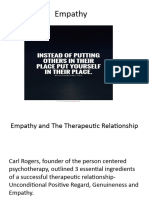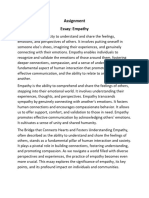0% found this document useful (0 votes)
65 views5 pagesEmpathy's Role in Emotional Intelligence
1. Empathy is the ability to understand another person's emotions and experiences by perceiving the world from their perspective rather than one's own. It enhances emotional intelligence by allowing better understanding of others and stronger relationships.
2. Daniel Goleman identified three types of empathy: cognitive empathy involves understanding another's perspective without sharing their feelings, emotional empathy means sharing the feelings of another, and compassionate empathy involves feeling with others and being motivated to help them.
3. Empathy improves emotional intelligence by helping to better understand, communicate with, and regulate emotions of both oneself and others. This leads to stronger relationships, self-awareness, decision-making, mental health, and stress management.
Uploaded by
kanakCopyright
© © All Rights Reserved
We take content rights seriously. If you suspect this is your content, claim it here.
Available Formats
Download as PDF, TXT or read online on Scribd
0% found this document useful (0 votes)
65 views5 pagesEmpathy's Role in Emotional Intelligence
1. Empathy is the ability to understand another person's emotions and experiences by perceiving the world from their perspective rather than one's own. It enhances emotional intelligence by allowing better understanding of others and stronger relationships.
2. Daniel Goleman identified three types of empathy: cognitive empathy involves understanding another's perspective without sharing their feelings, emotional empathy means sharing the feelings of another, and compassionate empathy involves feeling with others and being motivated to help them.
3. Empathy improves emotional intelligence by helping to better understand, communicate with, and regulate emotions of both oneself and others. This leads to stronger relationships, self-awareness, decision-making, mental health, and stress management.
Uploaded by
kanakCopyright
© © All Rights Reserved
We take content rights seriously. If you suspect this is your content, claim it here.
Available Formats
Download as PDF, TXT or read online on Scribd
/ 5










































































